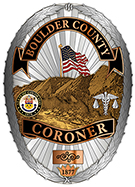The Family Assistance Unit is a program in the Boulder County Coroner’s Office that was established in 2022. Led by the Family Assistance Coordinator, the unit provides support services and resources to those who have lost a loved one due to a sudden or unexpected death.
The mission of the Family Assistance Unit is to provide assistance to the families, relatives, and friends of those affected by a sudden or unexpected death. The unit offers assistance by explaining the role of the coroner’s office and by helping people find resources for any identified needs. The core values of the unit are serving with care, communication, and dedication for as long as needed.
Our team has found it critical to make contact with those grieving early on and continue to work with people until support is no longer needed (30-90 days on average). The Family Assistance Unit offers support services and resources, provides guidance on next steps that often go beyond the coroner’s involvement, and provide community referrals. The Family Assistance Unit’s interaction with families and loved ones is concurrent with but separate from that of the death investigation itself. We provide support services and resources. We also provide case updates regarding timeline, death certificate updates, and help with general questions.
On behalf of the Boulder County Coroner’s Office, we extend our sincerest condolences on your loss. We understand you may have questions about the coroner’s involvement with your loved one. Our hope is that the information provided below will help answer some of those questions. If you have additional questions that are not answered on the FAQ page, please contact the office directly. Our goal is to provide needed support while you navigate your loss. We want to provide you with as much information as possible so that you can make well informed decision on behalf of your loved one.
Next Steps
After a family member, relative, or friend dies you may be asking yourself what do I do now? We recognize that you may be experiencing shock, intense sadness, and difficulty processing what has happened, and therefore it can be difficult to identify which steps to take next. We want you to know that you do not have to do this alone, and we encourage you to ask for help from family members or friends. The Family Assistance Unit has created a helpful tool that can aid you in navigating through these practicalities, titled After the Loss.
Confirmation of Death
Sometimes, as you are working through next steps, there might be a request from an institution or organization to confirm the death in order to manage those handlings/accounts. The Boulder County Coroner’s Office can provide a Confirmation of Death letter to an individual who requests one for the purposes stated above, at no cost. Please email your request to the investigations teams using this email: bccoinvestigations@bouldercounty.gov.
Resources
Navigating the loss of a family member, relative, or friend can be incredibly difficult and confusing. The Family Assistance Unit assists in providing resources that will support you in an emotional, logistical, and financial manner. You are not alone is this process, and the resources listed below can be of great value. We also encourage you to reach out to friends or family for help or guidance, and to consider joining a support group or seek therapy.
End-of-Life Planning
End-of-life planning is a crucial process that ensures your final wishes are respected and that your loved ones are supported during an already challenging time. By planning ahead, you can clearly communicate your preferences regarding medical care, funeral arrangements, and the distribution of your assets. This not only provides peace of mind for you but also alleviates the emotional and financial burden on your family. Moreover, having a comprehensive plan helps prevent legal disputes and ensures a smoother process for the involved parties. Taking the time to address these important matters now can make a significant difference for everyone involved in the future. The links below can assist in initiating that process.
Please visit our Mortuary and Donation Information page for a list mortuaries in Boulder County, all of which offer end-of-life planning options.
End-of-Life Planning Checklist
LGBTQ+ Advance Care Planning Toolkit
Veterans End-of-Life Planning
Advanced Care Planning for Patients and Families
Colorado Bar Association


